‘I hate chocolates!’: why Forrest Gump sent Winston Groom running for the hills
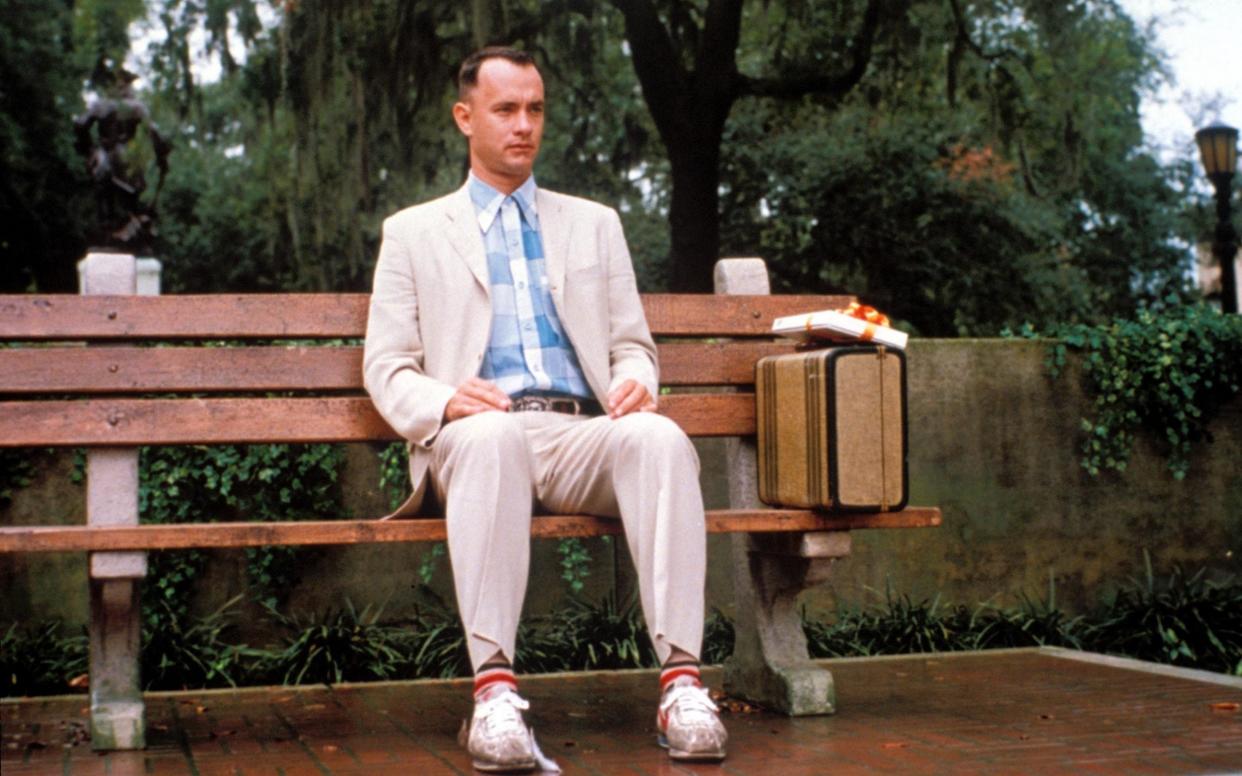
Forget Forrest Gump’s famous line, “Life is like a box of chocolates.” The real line – or the original line, at least, from the 1986 novel by Winston Groom – is “Bein an idiot is no box of chocolates.”
“Why the hell didn’t they use my line? Why are they using this line?” said Groom, interviewed after the film’s release. “Well, what do I know? Everywhere I go people send me chocolates. I hate chocolates!” But the author would have to concede that the reimagined line of dialogue, like the film’s liberal interpretation of his story, was a success. “It’s on everybody’s tongue, the box of chocolates business.”
Winston Groom – who has died, aged 77 – relinquished ownership of his character swiftly after the film’s release in July 1994. Gump – a slow-witted boy turned accidental hero, sports star, and shrimping millionaire – was immediately accepted as an icon of wholesome Americana. His nuggets of doe-eyed wisdom (alongside the box of chocolates zinger, Gumpisms such as “Stupid is as stupid does”) and biggest moments (“Run, Forest! Run!”) became oft-repeated, universally-recognised lines from the cultural lexicon.
And though Tom Hanks already had an Academy Award win under his belt, having won Best Actor for Philadelphia, it was Forrest Gump that turned him into Hollywood’s most lovable A-list heavyweight. The character belonged to the audience and Hanks as much as he did Winston Groom.
Forrest had also undergone significant changes in his eight-year journey from page to screen (in development hell terms, the equivalent of Forrest’s epic run across the United States). The original Gump was 6’6” and 240lbs of solid man. In fact, Groom has envisioned John Goodman in the role instead of the comparatively slight Hanks.
The original Gump was an idiot savant – an idiot by his own admission, but also a brilliant mind for advanced mathematical equations, musical instruments, and chess. Though he’s not nearly as likable: swearier, hornier, and prone to being led astray by women, money, and marijuana.
Winston Groom grew up in Mobile, Alabama (also Forrest’s hometown in the original book) and attended the University of Alabama. He did a 13-month tour of duty in Vietnam and worked as a journalist with The Washington Star for eight years, before he quit to write his first book – Vietnam-set novel Better Times Than These. He wrote another three books before he started work on Forrest Gump.
The idea had come from a story Groom’s father had told him, when reminiscing about a boy with learning difficulties who he’d grown up with in Mobile during the early 1900s.
“The kids would chase him and tease him and throw sticks at him and so forth,” Groom recalled. “And one day this boy’s mother bought a piano… within two days this gorgeous piano music came wafting out of this house. And this young man was a genius. So the kids in the neighbourhood decided they were going to take this kid under their wing. I thought that’s a nice story.”
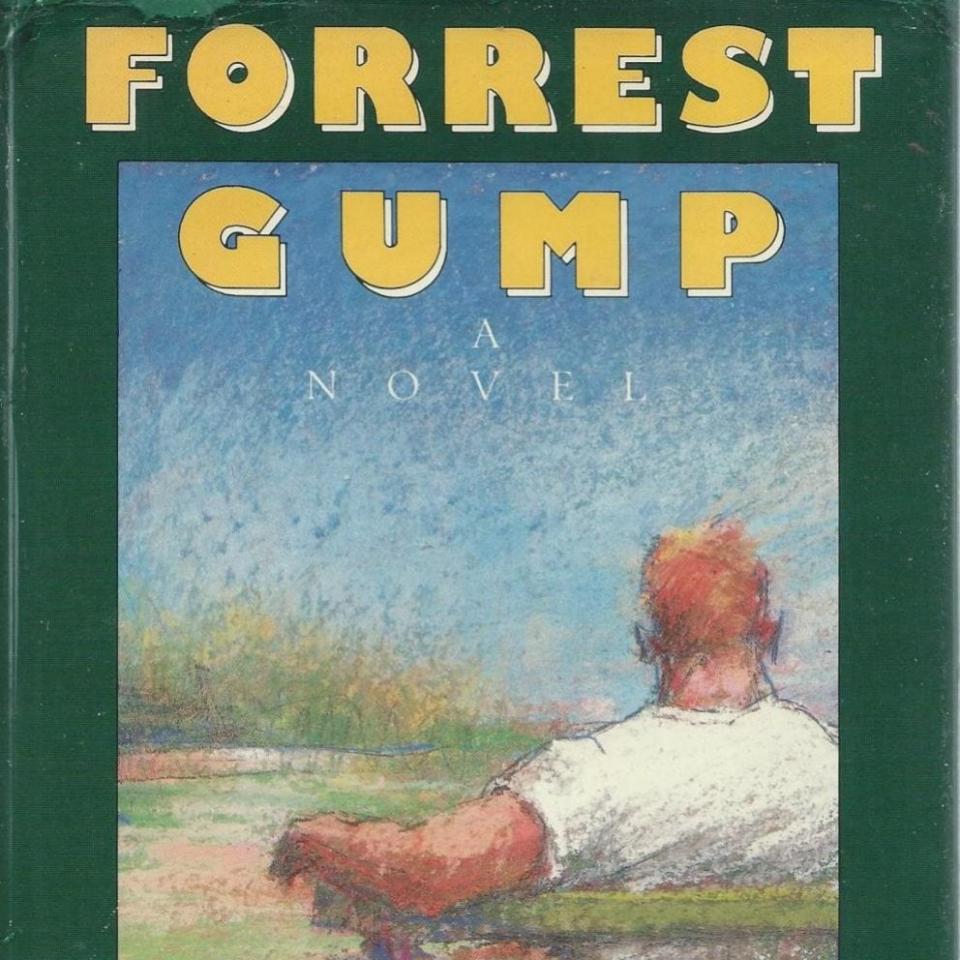
By midnight Groom had written the first chapter. Within six weeks he’d written the entire book. He has often commented that the book “wrote itself” and came from his “lizard brain”, an instinctive, primal part of the mind. The story, he says, bypassed his conscious mind to come straight out of the fingers. “It never happened before and I don’t think it’ll happen again,” he later said. “I didn’t have any notes, I didn’t have any research, I just sat down everyday and thought, 'What’s he going to do today?'”
Groom had finished the book within six weeks, written in Gump’s first-person garbled, misspelt Alabamian, and sent the manuscript to editor Willy Morris. “I didn’t know what in the hell to think about it,” Groom said. “My gut feeling was, ‘This is something.’” And he was right: Morris called back two weeks later and told him simply, “Don’t change a word.”
The movie rights had been picked up before the book was published and developed under producer Wendy Finerman at Warner Bros. Groom began work on several unsuccessful drafts of the script, before he was fired. The studio also lost interest after the release of Rain Man, which had trumped Gump with its own idiot savant, the jabbering, card-counting Raymond, played by Dustin Hoffman.

Warner Bros eventually traded the project with Paramount for Kurt Russell-starring Die Hard-on-a-plane actioner Executive Decision, with Wendy Finerman still producing under her own company. Barry Sonnenfeld was attached but had to depart the project to direct Addams Family Values, leaving the film in the hands of director Robert Zemeckis, screenwriter Eric Roth, and Tom Hanks. Once Zemeckis and Hanks were on board, Groom said, "I've never seen a movie get made so fast in my life."
As for the script, Groom said, “They would send them to me from time to time and I would make comments, and they’d either take ‘em or they wouldn’t.” He recalled pointing out historical accuracies in the script’s portrayal of the University of Alabama, where Forrest was a football star. The production dismissed his concerns, but once the script had been passed to the university, the administration refused the film permission to shoot there.
Much like the finished film version, Groom’s original novel is hooked on Gump wandering into key historical moments of the 20th century (the doctored footage of Tom Hanks shaking hands with the likes of John F. Kennedy and Lyndon B. Johnson were big selling points of the film back in 1994): Gump plays football under legendary coach “Bear” Bryant; he becomes a war hero in Vietnam; goes to the White House and shows the President the bullet wound in the backside.
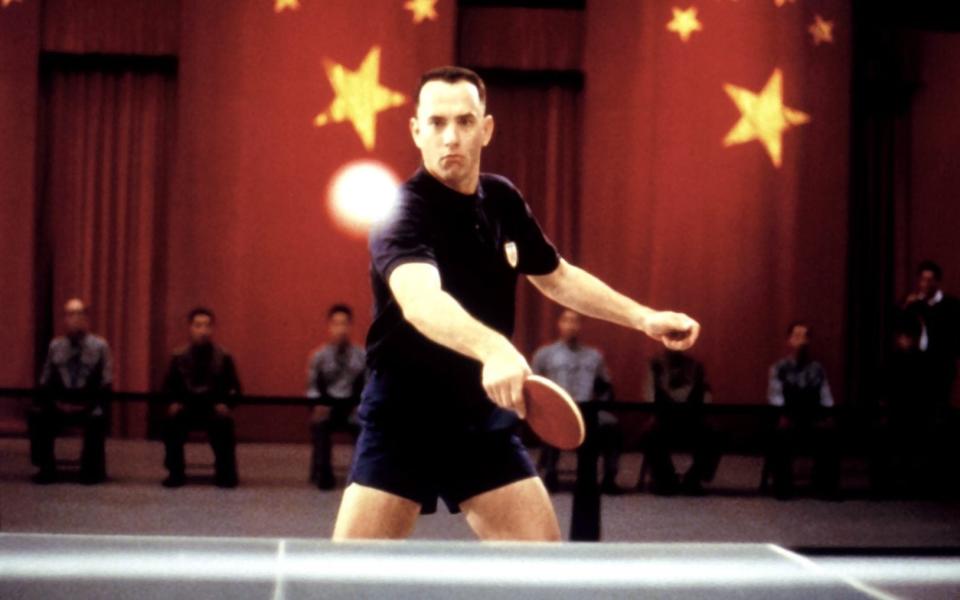
He represents his country playing ping pong in China and founds a successful shrimping company. But there are bizarre escapades left out from Groom’s book: Forrest saves Chairman Mao from drowning; he is sent into space with a male orangutan called Sue; spends four years as captive of a cannibal tribe in New Guinea; becomes a nappy-wearing professional wrestler called “The Dunce”; and lands a part in a Raquel Welch movie.
Instead, the film would add several new chapters to Forrest’s adventure: having braces fitted to his legs; running across America; and his relationship with Lieutenant Dan (Gary Sinise), who is much changed from being a meditative, philosophical character in the novel.
Overall, Roth’s script reimagines Groom’s story as a sentimental, conservative romance, hinged of Forrest’s lifelong love of Jenny (played by Robin Wright), who is saddled with the original Forrest’s filthiest character flaws – drugs, sex, loose morals – in the translation to screen.
The Forrest Gump movie’s journey through 20th century history is really an uncynical celebration of the American dream. Even a thick-headed lump like Forrest can become a war hero, a multi-millionaire, or sporting champion. All it takes is to get off your keister and run the width of the country and back again to achieve it. Groom’s book, on the other hand, is deeply – and sometimes ludicrously – satirical, rocketing into the fantastical as it lampoons modern Americana. Its sharpest moment comes when Richard Nixon tries to sell Forrest a watch on the doorstep of the White House, pulling up his sleeve to reveal an armful of knocked off watches, like some backstreet spiv.
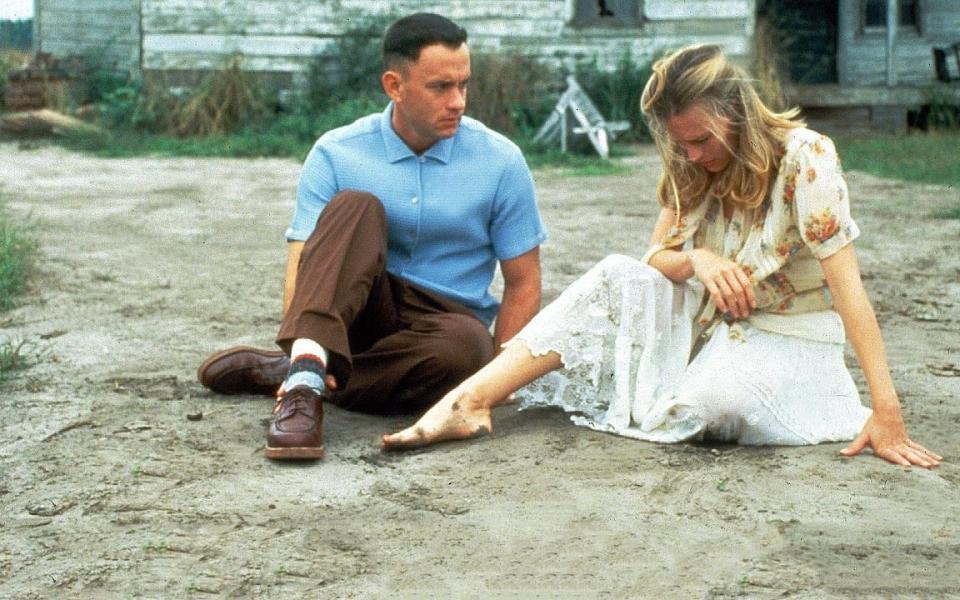
The mark of a good adaptation is that the spirit of the original text remains strong – no matter how many plot, story, or character details get changed. Arguably, the Forrest Gump film adds the spirit; Gump’s wide-eyed innocence, something lacking from his book counterpart, is what makes it so affecting. The film has overshadowed the novel so much that it’s impossible to read without that context in mind.
Despite the many changes to the character, tone, and plot of his story, Winston Groom was satisfied the film had captured the essence of his creation. "They kept the character pretty much as I intended,” he told the New York Times in 1994. “As I see it, it's a story about human dignity, and the fact that you don't have to be smart or rich to maintain your dignity even when some pretty undignified things are happening all around you."
He later told Tuscaloosa News, “I would have probably preferred my version of it but that thing never would have opened.”
The film, of course, was a giant hit. It made over $670 million worldwide and won six Academy Awards, including Best Picture, Best Actor, and Best Adapted Screenplay. There was some small controversy when Winston Groom wasn’t thanked or acknowledged in the acceptance speeches. “It was the movie people’s time to shine,” he later said.
Before the movie, the book had sold 30,000 hardcovers; after the film it went on to sell 2.5 million copies. "Where were you eight years ago?” Groom said about the readers who had jumped on the movie bandwagon, speaking in the New York Times. “It's the same damn book."
Groom wrote two spinoffs – The Wit & Wisdom of Forrest Gump, and a sequel Gump & Co. But the author wasn’t entirely prepared for some aspects of the film’s immediate cultural impact.
“It drove me crazy,” he later said. “People on cable news were arguing if Forrest was a liberal or a conservative. Journalists were calling to ask my opinion. I told them I had no idea, and I don’t think Forrest did, either. It started to get ridiculous. Someone wrote a piece for the Washington Post and said Forrest had no ambition and was a terrible role model. About that time, I headed for the mountains to escape it all and didn’t answer the phone for a couple of months.”
While Groom often commented on what the book’s renewed success meant for him – “I got to upgrade my brand of toilet paper,” Groom said – he was unhappy with his payoffs from Paramount. Groom was paid $350,000 for the rights and contractually entitled to 3 percent of the movie’s net profits, but Paramount claimed because of production, distribution, and marketing costs – which critics would call crafty “Hollywood bookkeeping” – the film was still performing at a loss in 1995. It was reported in the New York Times that Groom had enlisted a lawyer and Paramount gave him a down payment of $250,000 on future profits.
Groom sold the rights to his sequel novel to Paramount for a reported seven figure sum, which likely smoothed over tensions between the author and studio. According to Eric Roth, the movie sequel was set to feature Forrest dancing with Princess Diana, being present for the Oklahoma bombing, and riding in the backseat for OJ Simpson’s police chase across Los Angeles. But it was shelved after the 9/11 terror attacks.
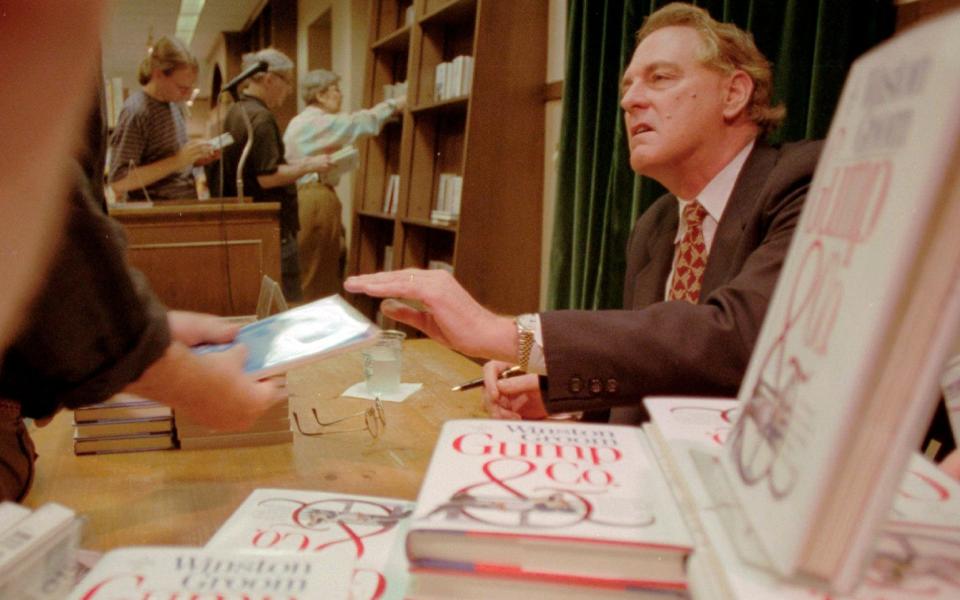
“Literally, I turned [the script] in the day before 9/11,” Roth told Yahoo earlier this year. “And Tom and I and Bob [Zemeckis] got together on 9/11 to sort of commiserate about how life was in America and how tragic it was. And we looked at each other and said, ‘This movie has no meaning anymore, in that sense.’”
In the years after, Winston Groom mostly wrote military non-fiction. He returned to fiction in 2016 with the novel El Paso. But Forrest Gump remained Groom’s biggest legacy. “There’s not a week that goes by that half a dozen people don’t ask me for an autograph for Gump,” he once said. “In the end, I’m just really damn grateful for the whole thing.”
It was Gregory Peck – who Winston Groom had met after the Oscars – who perhaps best summed up both the impact and legacy of Groom’s character. “You created one of the few heroes that we have around here lately,” Peck told him. “They don’t have heroes anymore, they have anti-heroes. The nearest one I can think of, that we have as a national hero in this country, is Forrest Gump. And he’s an idiot.”


